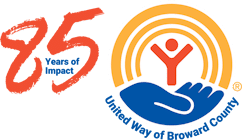Samuel is the sole provider for his wife and two children, under the age of five. Since the onset of the pandemic, his earnings from work as a ride-sharing driver have plummeted by more than 50 percent. With little savings in his bank account, Samuel quickly found his family missing rent payments and facing the daunting threat of an eviction. He called 211 Broward to find out what resources were available in the community and was referred to a United Way funded partner for financial assistance. Through United Way of Broward County’s COVID-19 Emergency Fund, we provided the partner with the resources to prevent Samuel and his family from becoming evicted.
Samuel is one of nearly 15,000 people who have called 211 Broward this past year to request rental or mortgage assistance, which is almost double the number of requests the same time last year. His household is one of the nearly 260,000 ALICE (Asset Limited, Income Constrained, Employed) households in Broward County whose wages are not rising with the cost of living. These are hard-working families, many of the frontline workers like drivers, home health aids, and hospitality staff, who are just one emergency away from a financial crisis. For Samuel’s family, that crisis was the pandemic.
Samuel was able to leverage our community resources quickly and early enough to avoid an eviction. Thousands more will not be as lucky in our state and our county. From March to December of 2020, there were 47,874 evictions filed in Florida, over 7,000 of which were filed in Broward County.
A disproportionate number of evictions across the nation is threatening communities of color. According to an analysis by the Center for Public Integrity, nearly two-thirds of the eviction cases studied in Florida and Georgia, particularly, were against tenants living in areas with a predominant minority population. The Annie E. Casey Foundation’s KIDS COUNT Report reveals that 31% of Black and 26% of Latino households reported being on the verge of missing a rent or mortgage payment, compared to 12% of white households.
Through the generosity of individual donors and corporate partners, United Way of Broward County has assisted residents like Samuel with over $1 million to address basic needs like rent/mortgage payments throughout the pandemic. Without a roof over their heads, Broward County residents cannot thrive in other areas of their lives. This housing-first approach has driven United Way of Broward County’s health, education and financial stability work in our community for decades. And, it is more important now than ever with the impending evictions crisis.
Our direct assistance is not enough to help the thousands of ALICE families struggling with pending evictions in our community. In partnership with United Way of Florida, and several local United Ways across the state, we have been advocating for policy solutions at the State Capitol this legislative session to help mitigate our imminent evictions crisis.
House Bill 1193 and House Bill 1195, by Rep. Vance Aloupis, Jr, R-Miami, would allow anyone evicted from their home due to COVID-related issues such as the loss of a job or reduced income to seal their records and be exempt from certain public records requirements. We are supporting this bill because we do not want ALICE families to be penalized for an eviction for the rest of their lives, adding to future housing insecurity.
We urge that legislators in the Florida Senate join their House colleagues and make sure that Senate Bill 1746 and Senate Bill 1748, by Sen. Shevrin “Shev” Jones, D-West Park, moves forward in the upper chamber. The evictions crisis is looming and it is real. We should not wait to act. It is our responsibility to ensure that ALICE households like Samuel’s can have peace of mind in knowing that they will still have a home to go to when this nightmare is over.
NO ESPEREMOS A QUE SEA DEMASIADO TARDE, RESPONDAMOS LA CRISIS DE DESALOJOS AHORA
Samuel es el único sostén de su familia. Vive con su esposa y sus dos hijos pequeños en el centro del condado de Broward. Cuando comenzó la pandemia sus ingresos como chofer por cuenta propia se vieron reducidos por más de un 50 por ciento. Tuvieron que recurrir a los pocos ahorros que tenían guardados, pero esos acabaron rápidamente. Samuel y su familia estuvieron al punto del desalojo porque no tenían dinero para pagar el alquiler de su apartamento de dos cuartos. Desesperado, Samuel acudió al 211 Broward, la linea de asistencia a la comunidad de nuestro condado, para información sobre los recursos económicos disponibles a familias que estuvieran pasando por situaciones económicas difíciles por causa de la pandemia. Fue contactado con una de las organizaciones sin fines de lucro que recibe fondos de United Way del Condado de Broward para ayudar a personas necesitadas. Con el apoyo financiero de United Way y sus aliados comunitarios, Samuel pudo evitar ser desalojado de su hogar.
Samuel fue uno de los casi 15.000 residentes de Broward que acudieron al 211 el año pasado pidiendo ayuda para cubrir gastos de alquiler o para pagar su hipoteca, lo cual representa el doble de los casos que se registraron en 2019. Su familia está entre las casi 260.000 familias en el condado de Broward que no ganan lo suficiente para cubrir sus necesidades básicas (familias ALICE, por sus siglas en inglés). Las familias ALICE son encabezadas por personas trabajadoras – choferes, maestras de guarderías, meseros, entre otros – que viven de cheque a cheque y sólo basta una emergencia para entrar en crisis financiera.
La historia de Samuel tuvo un final feliz. Él supo acudir a tiempo a los recursos que brinda nuestra comunidad. Sin embargo, miles de residentes en el condado de Broward no correrán con la misma suerte. Desde marzo a diciembre de 2020, el estado de la Florida registró 47.874 órdenes de desalojo de viviendas, más de 7.000 de estas fueron registradas en nuestro condado.
La crisis de desalojos que se está viviendo en nuestra comunidad y todo el país afecta de manera más fuerte a comunidades hispanas. Un informe de La Fundación Annie E. Casey reveló que un 26 por ciento de familias latinas en nuestro país están a punto de atrasarse en sus alquileres o hipotecas, comparado con un 12 por ciento de hogares de personas de la raza blanca.
Gracias a la generosidad de donantes y empresas con sedes locales, United Way del Condado Broward ha apoyado con más de 2 millones de dólares a residentes como Samuel para que puedan pagar sus alquileres y hipotecas durante la pandemia. Sin un techo seguro, es casi imposible que alguien pueda salir adelante.
Sin embargo, no tenemos suficientes recursos para brindarle este tipo de asistencia financiera a todos los que la necesitan en nuestra comunidad. Por eso, también abogamos en Tallahassee por proyectos de leyes que sí beneficien a todos los que estén pasando por la amenaza de un desalojo. Ese tipo de cambio a nivel de política pública estatal, nos permite mitigar los daños que vienen después del desalojo de una familia.
En esta sesión legislativa, la cuál debe concluir a finales de este mes, estamos apoyando un proyecto de ley que permitirá que la víctima de un desalojo por causa de la pandemia pueda apelar su caso en el sistema judicial para que se elimine el record del desalojo de su expediente judicial. United Way del Condado Broward apoya al Senate Bill 1746 y al Senate Bill 1748, presentados por nuestro senador local, Sen. Shevrin “Shev” Jones, D-West Park, al igual que versión idéntica que circula en la cámara baja, House Bill 1193 y House Bill 1195, de Rep. Vance Aloupis, Jr, R-Miami. No es justo que el record de un desalojo causado por algo fuera de nuestro control, como la pandemia, afecte a los residentes de este condado para toda la vida.
Instamos a nuestros legisladores en el senado a que sigan el ejemplo de sus colegas en la cámara y que apoyen estos proyectos de leyes. Nuestra comunidad pasará por más desalojos en los próximos meses. No dejemos que esta crisis nos agarre por sorpresa cuándo podemos actuar de forma preventiva aprobando estos proyectos de leyes ahora. Ayudemos a que familias como la de Samuel aún puedan garantizar un techo cuando esta pandemia acabe.

